A decade of transformational cancer care
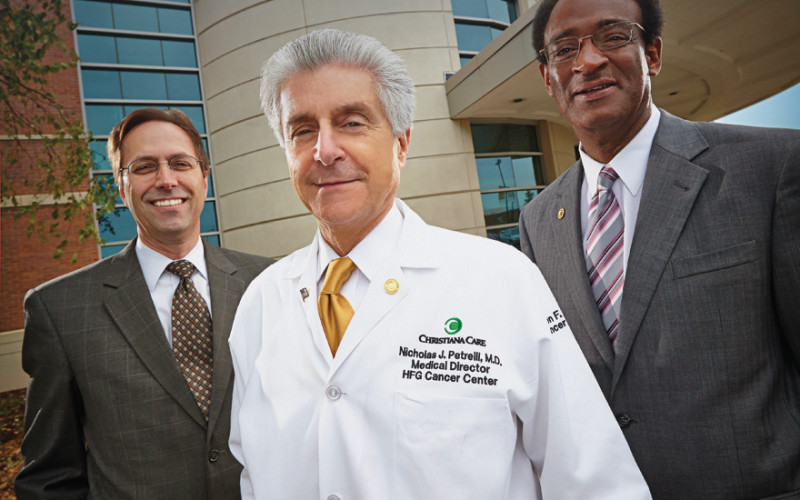
Ten years ago, the Christiana Care Cancer Program made a transformational leap forward in the delivery of quality, value-driven cancer care and services to our community. In only a decade, Christiana Care has established the Helen F. Graham Cancer Center & Research Institute as a national leader in comprehensive, multidisciplinary cancer treatment, services and research.
“What we do isn’t just a job to us; it is our vocation,” said Bank of America endowed and founding Medical Director Nicholas J. Petrelli, M.D. “We celebrate the lives and the experience of the many who have come to us for care and treatment, but our focus is on the greater challenge — ending the specter of cancer.”
The work of a decade has made an impact in numbers and lives. Cancer mortality rates in Delaware are falling at twice the national average. Before the Graham Cancer Center opened, Delaware had the second highest cancer mortality in the nation. Today it is 14th. Cancer rates also are declining, thanks in part to advances in cancer treatment and technology, and thanks to collaborations on cancer screening and prevention with other Delaware hospitals, providers, state government and community outreach groups
In 2007, the National Cancer Institute (NCI) selected the Helen F. Graham Cancer to serve as an NCI-selected community cancer center program (NCCCP), launching Christiana Care into a top national network working together to bring the latest cancer treatments to patients in their own communities. Today, the Graham Cancer Center ranks among the country’s top five NCCCPs, recognized as a model for cancer treatment, research and supportive care.
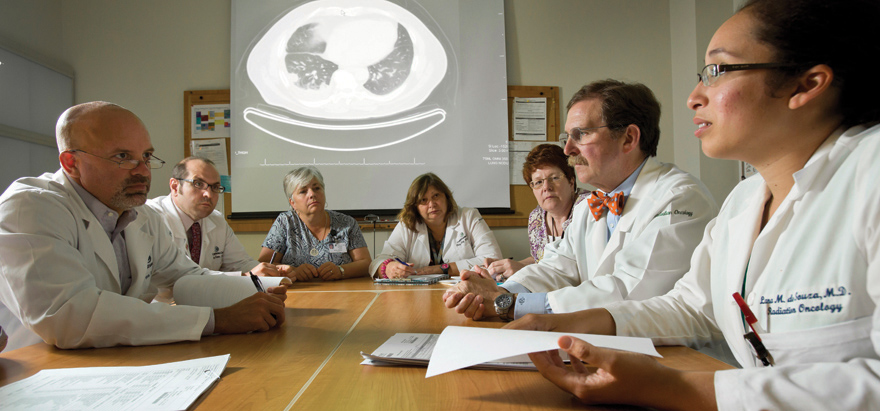
Multidisciplinary care
 Even before 2003, Christiana Care’s cancer program was advocating for cancer patients, their caregivers and families, citing a pressing need to make the best available care easily accessible. Before construction began on the state-of-the-science facility that would become the Helen F. Graham Cancer Center & Research Institute, multidisciplinary, disease-specific treatment centers (MDCs) tailored to every type of cancer were already taking shape. MDC conferences bring patients face-to-face with a complete team of specialists needed to begin therapy, all in one visit. A surgeon, medical oncologist, radiation oncologist, geneticist, health psychologist, nurse navigator, subspecialists and support staff all participate to help the patient map out a personalized treatment plan.
Even before 2003, Christiana Care’s cancer program was advocating for cancer patients, their caregivers and families, citing a pressing need to make the best available care easily accessible. Before construction began on the state-of-the-science facility that would become the Helen F. Graham Cancer Center & Research Institute, multidisciplinary, disease-specific treatment centers (MDCs) tailored to every type of cancer were already taking shape. MDC conferences bring patients face-to-face with a complete team of specialists needed to begin therapy, all in one visit. A surgeon, medical oncologist, radiation oncologist, geneticist, health psychologist, nurse navigator, subspecialists and support staff all participate to help the patient map out a personalized treatment plan.
Nurse navigators
Since the earliest days of the Helen F. Graham Cancer Center & Research Institute, the nurse navigator program has been a signature service to patients. Christiana Care nurse navigators have helped more than 70,000 patients with some 650,000 individual support services. Graham Cancer Center staff provide training and consultation to help cancer centers around the country emulate this successful program.
Radiation oncology
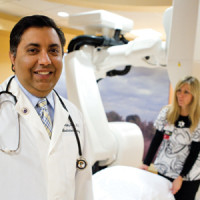 The Radiation Oncology Department serves patients at three locations in Delaware and Maryland, offering advanced technology and leading experts directing care and treatment. A fourth site will open in 2014 on U.S. 202 in Concordville, Pa. Christiana Care radiation oncologists adapt the latest imaging and treatment advances into clinical practice, including:
The Radiation Oncology Department serves patients at three locations in Delaware and Maryland, offering advanced technology and leading experts directing care and treatment. A fourth site will open in 2014 on U.S. 202 in Concordville, Pa. Christiana Care radiation oncologists adapt the latest imaging and treatment advances into clinical practice, including:
- Image-guided intensity modulated radiation therapy (IGRT/IMRT) stereotactic radiosurgery.
- High-dose-rate brachytherapy to treat gynecologic, skin and breast cancers.
- A new training program in medical physics.
The Graham Cancer Center is also home to Delaware’s first and only CyberKnife robotic radiosurgery system, which targets hard-to-treat tumors in the brain, lung and spine with pinpoint accuracy.
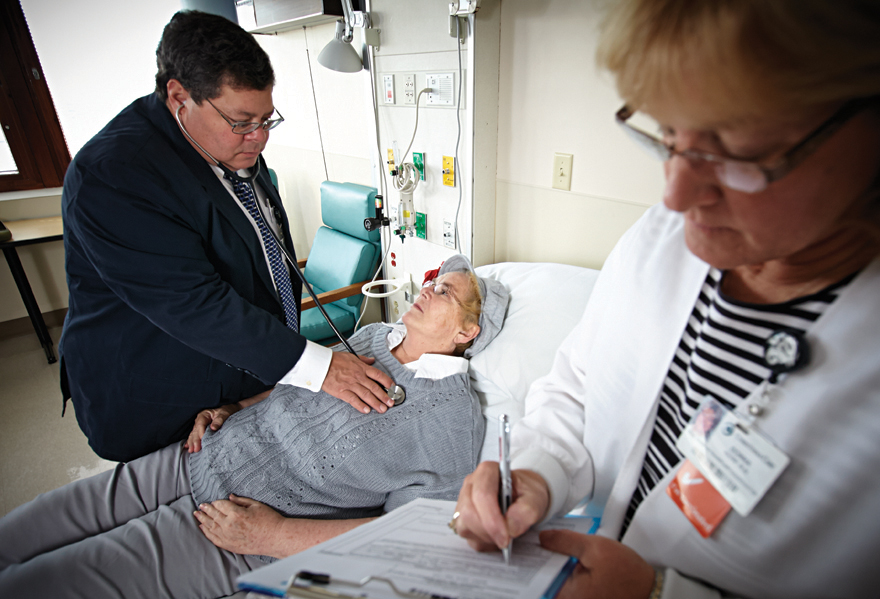
Hematology/Oncology
The inpatient Hematology/Oncology Unit at Christiana Hospital offers 24-hour care and support for cancer patients and includes a specialized unit for patients in the Bone Marrow/Stem Cell Transplant Program. This program, which celebrated its 17th anniversary in August, is recognized by the National Marrow Donor Program as a performance leader and accredited as an Apheresis Collection Center, Bone Marrow Collection Center and Bone Marrow Transplant Center.

Care management and support
Social workers, nurse navigators, financial assistants, registered dieticians, genetic counselors, health psychologists, pain and rehabilitation specialists, and wellness coaches are all part of Christiana Care’s award-winning Cancer Care Management team. They offer assistance, encouragement and support to patients along the entire cancer care continuum.
The Graham Cancer Center was first in Delaware to offer specialized physical and occupational therapy for patients living with cancer. The oncology rehabilitation center has an experienced group of professionals under the direction of Lisa Marshall, OTR-L, who continually work to improve quality of life for cancer patients.
The Graham Cancer Center’s survivorship program was among the nation’s first and is widely recognized for innovation in supporting patients through life beyond cancer.
The Breast Center
The Christiana Care Breast Center is the only facility in the region to offer leading-edge breast cancer care, from diagnosis to treatment, all under one roof. The Breast Center offers 3D mammography, the latest breast cancer screening and diagnostic technology, and the only dedicated breast MRI unit in the region.
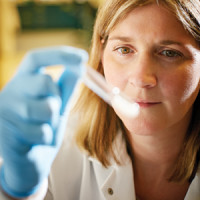
Research benefits patients today and tomorrow
Christiana Care’s cancer research program is one of the largest among community-based hospitals in the country, with some 120 active clinical trials in every kind of cancer. Christiana Care was third in the nation last year for patient enrollment in clinical trials. These trials can be a patient’s best opportunity for treatment; studies show survival rates and outcomes are better when patients participate in a clinical trial.
The NCI-funded Christiana Care Community Clinical Oncology Program (CCOP) is one of the top enrollers in cancer clinical trials in the newly formed Alliance of Clinical Trials in Oncology.
The Center for Translational Cancer Research
In the West Pavilion of the Graham Cancer Center, the 7,000 square-foot Center for Translational Cancer Research (CTCR) is where scientists are solving research riddles in the lab that translate into better treatments for cancer patients at the bedside. The program is in collaboration with the University of Delaware, the Wistar Institute in Philadelphia and Delaware State University.
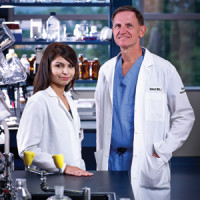
Researchers include:
- Bruce Boman, M.D., Ph.D., MSPH, FACP, director of Cancer Genetics and Stem Cell Biology at the CTCR, whose published research identifies a new marker for colon cancer stem cells.
- Robert Witt, M.D., director of the Multidisciplinary Head & Neck Cancer Center, and molecular biologist Swati Pradhan-Bhatt, Ph.D., Graham Cancer Center director of Tissue Engineering, who are developing laboratory-engineered salivary-gland tissues that could eventually lead to artificial implants for patients who suffer complications from radiation treatments.
- Molecular biologist Jennifer Sims- Mourtada, Ph.D., CTCR’s senior research scientist, who is tracking a protein linked to aggressive breast cancer. Her efforts to identify why some cancers are resistant to treatment could aid development of more individualized therapies and less-invasive preventive approaches.
Pharmaceutical clinical trials
A robust pharmaceutical trials program is conducting Phase I and Phase II drug trials in collaboration with private industry and university research centers across the country. Many of these studies give our patients the opportunity for leading-edge cancer treatments, tailored to their particular cancer. Examples include trials for advanced breast cancer, the largest ever anti-cancer vaccine trial for non-small-cell lung cancer and the very first gene therapy trial in Delaware that targets melanoma.
Tissue procurement
Christiana Care’s Tissue Procurement Center has provided research-quality biospecimens for the Cancer Genome Atlas Project since 2009, supporting the work of scientists to unlock the genetic secrets of cancer’s origins and vulnera¬bility. Exciting results have emerged, including the discovery of four genetically different subtypes of breast cancer in the largest, most comprehensive breast cancer genomic study to date.
The National Cancer Institute selected the Graham Cancer Center to be a Cancer Genome Atlast Project collection training facility for university programs across the United States. The center also processes biospecimens for the Wistar Institute and the CTCR for melanoma, ovarian, head and neck, lung, breast and colon cancer research.

Outreach and prevention
Under the direction of Nora Katurakes, RN, MSN, OCN, manager of Community Health Outreach and Education, the cancer center offers screenings for early detection of skin, prostate, breast, cervical and colorectal cancers, as well as combination screening for heart, diabetes and other cancer risks. At the same time, the team provides education about cancer prevention and healthy behaviors. Partnerships through the Delaware Cancer Prevention and Control Program’s Screening for Life and others have broadened access to health screenings.
In April 2013, the Journal of Clinical Oncology published an article co-authored by Katurakes and medical oncologist Stephen Grubbs, M.D., a member of the Delaware Cancer Consortium, showing that overall colorectal cancer incidence in Delaware from 2002 to 2009 declined and closed the gap between African-American and white patients, saving $8.5 million in health care costs through earlier cancer detection and lower incidence.
Friends of the Helen F. Graham Cancer Center
The Friends of the Helen F. Graham Cancer & Research Institute have been outstanding partners in helping us care for our neighbors by working to raise funds and awareness for the treatment and prevention of cancer.
“Without their support, many of our programs and technologies would not have been possible,” Dr. Petrelli said.
The Friends have raised more than $2 million over the past decade to support research, technologies, patient-care services, and education and screening programs at the Graham Cancer Center.

The future of cancer care
Today’s Helen F. Graham Cancer Center is oriented toward providing patients with the best possible care in the present, and developing the tools to ultimately win the fight against cancer. Current goals include:
- Expanding screening, genetic counseling and prevention programs to reach all of our neighbors, especially those at highest risk for cancer.
- Ensuring the Center for Translational Cancer Research is a premier site for the synthesis of ideas, technologies and research focused on preventing and curing cancer.
- Strengthening partnerships and forging new ones to speed cancer research, treatment and prevention through clinical trials.
- Supporting the work of the CTCR and other research centers around the country with the biospecimen resources provided by the Tissue Procurement Center.
- Fostering the development of a Delaware Center for Cancer Biology, where physicians and scientists can exchange ideas and work together on cancer’s challenges.
“The future of cancer medicine is closely linked to the ongoing transformation of our vision into the reality of delivering patient-centered, value-based cancer care,” Dr. Petrelli said.